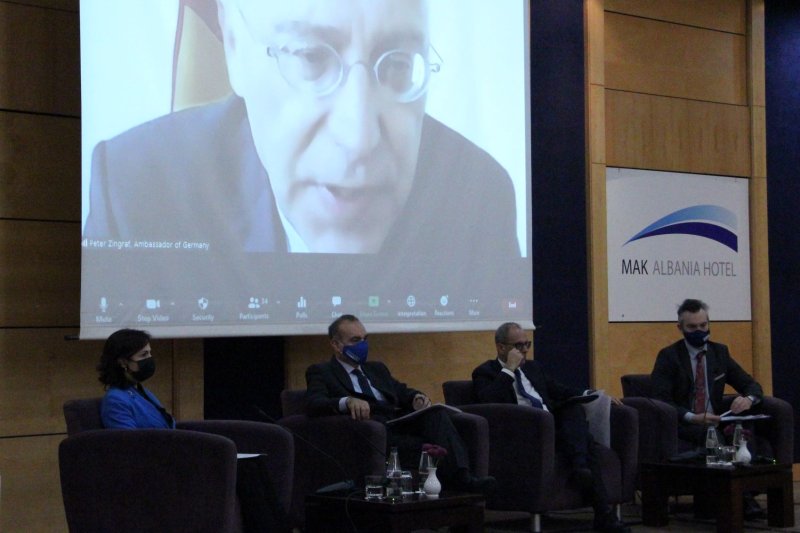OSCE Holds Conference on Issue of Enforced Disappearances and Missing Persons
“Enforced and Involuntary Disappearances in dictatorship and authoritarian past and contemporary settings: a social, legal and historical appraisal of transitional and transformation polices and mechanisms,” was the topic of an international conference that started Monday in Tirana, and is expected to last until Wednesday, 15 December.
The Conference, which would address the issue of the missing from historical, legal and sociological points of view, is jointly organized by the OSCE Presence in Albania and the University of Tirana’s Centre for Justice and Transformation, with the financial support of the German Government. The Conference aims to bring together academics, practitioners and policy-makers from any region of the world that experienced authoritarian regimes and dictatorships to explore and rethink the issue of the missing in the transitional justice and transformation settings to foster human rights and rule of law.
Delivering remarks in the Conference’s opening session were the Head of OSCE Presence in Albania Ambassador Vincenzo Del Monaco, Minister of Justice Ulsi Manja, Rector of Tirana University Artan Hoxha, German Ambassador to Albania Peter Zingraf, and the Commissioner of the Office of People’s Advocate (Ombudsperson) Ermonela Ruspi. The keynote speech was delivered by Robert Austin, Associate Professor, Department of History, Faculty of Art and Sciences, University of Toronto, on the topic of “Never Too Late: An examination of Albania’s on and off again experience with Transitional Justice.”
“I would like to take this opportunity to thank the donor of this project, represented here by the Ambassador of Germany, for its generous financial contribution. Dear Peter, this conference would not be possible without your utmost support,” said the Head of Presence, Ambassador Del Monaco, in his remarks, thanking the German authorities for their support to this event. “Not one single case of enforced disappearances seems to have been solved successfully to date. Justice and reconciliation is still pending for the missing persons’ relatives. Evidence suggests that they are often compelled to undertake identification and, in some cases, perform arduous excavation of suspected mass graves single-handedly,” he added. “Working closely with the Albanian institutions and civil society, the Presence has been involved in enhancing institutional capacities, supporting legislative and policy-making efforts as well as the promotion of academic and policy debate on the issue of missing persons in Albania.”
Addressing the conference over internet, Minister of Justice Ulsi Manja said that the issue of enforced disappearances should be dealt with utmost care and sensitivity. He also spoke the steps taken by the Albanian Government to tackle this issue over the last years, especially focusing on the coming establishment of the common database on missing people that will make possible the collection of accurate and reliable information on this category of people.
“Nothing belongs to the past, everything is present and has the potential to become the future,” said the German Ambassador, Peter Zingraf, quoting Fritz Bauer, the public prosecutor of the first of the Auschwitz trials in the 1960s. “Germany financially supports the OSCE project on transitional justice because we know about the importance of coming to terms with even the darkest sides of Albania’s history, and just like Fritz Bauer I truly believe that facing one’s past is fundamental for the wellbeing of the society, today and in the future.”
The Rector of the Tirana University, Artan Hoxha, voiced confidence that the Conference would produce tangible results, while pointing to the excellent co-operation between the University and the OSCE Presence in Albania. “The crimes dealt with in the present conference should not be left to the past, but they should rather be paid utmost attention to, as thy pose a threat to the future,” he said.
The Ombudsperson’s Commissioner, Ermonela Ruspi, said in her remarks that over the last three decades, the progress of transitional justice in Albania has met many obstacles. She referred to one of the key mechanisms of transitional justice, namely, that of the reparations, saying that it should be used without hesitation in regards to such severe injustices, such as the case of the missing people and enforced disappearances.
Circa 6,000 Albanians have gone missing during the communist regime, and their whereabouts are not known to this day. This serious human rights violation is deeply and incessantly affecting the families of the missing, who long for a grave to mourn their dear ones. It is a painful and haunting wound for the Albanian society, which needs to find redress no matter when or how it has happened. The OSCE Presence in Albania stands alongside the Albanian authorities in their efforts to identify and recover the bodies of the missing from the communist regime.













